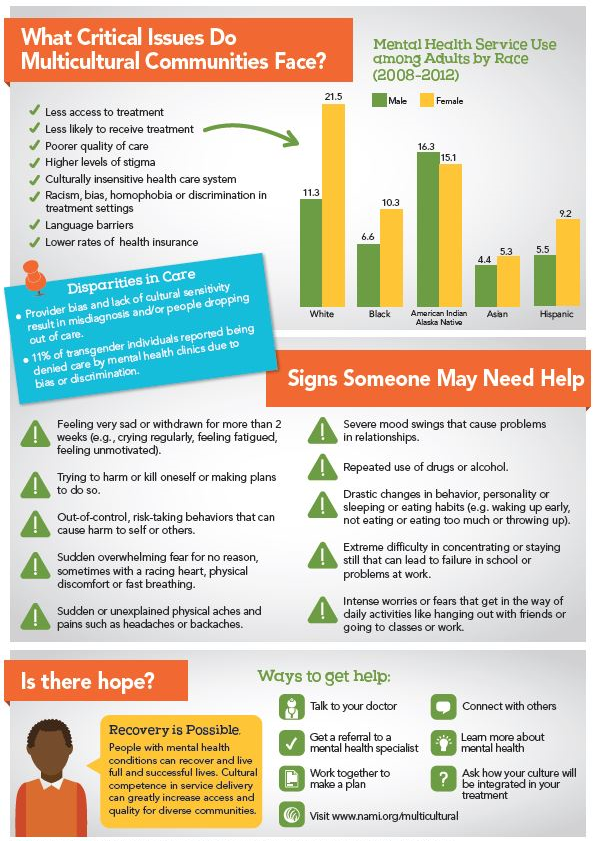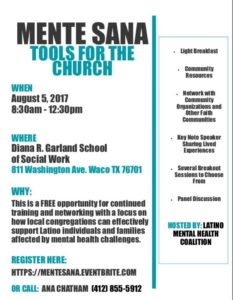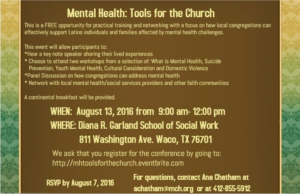By Laura Greenstein
Mental health conditions do not discriminate based on race, color, gender or identity. Anyone can experience the challenges of mental illness regardless of their background. However, background and identity can make access to mental health treatment much more difficult. National Minority Mental Health Awareness Month was established in 2008 to start changing this.
Each year millions of Americans face the reality of living with a mental health condition.
Taking on the challenges of mental health conditions, health coverage and the stigma of mental illness requires all of us. In many communities, these problems are increased by less access to care, cultural stigma and lower quality care.
America’s entire mental health system needs improvement, including when it comes to serving marginalized communities. When trying to access treatment, these communities have to contend with:
- Language barriers
- A culturally insensitive system
- Racism, bias and discrimination in treatment settings
- Lower quality care
- Lower chance of health care coverage
- Stigma from several angles (for being a minority and for having mental illness)
These are all in addition to the usual road blocks. Many cultures also view mental health treatment as a luxury, considering symptoms a “phase” that will eventually pass. These harmful perceptions of mental illness can further isolate individuals who desperately need help.
We can all help ignite change against these disparities and fight stigma this Minority Mental Health Awareness Month. It starts with learning more about mental health and informing your community.
Consider Giving A Presentation
Starting conversations about mental health in your community may feel intimidating—especially if your community views mental illness as a personal fault or weakness. But the more we talk about mental illness, the more normalized it will become. And NAMI is here to help!
Consider giving NAMI presentations to your community, like Sharing Hope for the African American community and Compartiendo Esperanza for the Hispanic and Latino communities. These presentations go over the signs and symptoms of mental health conditions as well as how and where to find help. If neither of these presentations fit your background, feel free to use them as models to create your own presentation tailored to your community’s needs.
Emphasize Treatment
Make sure to stress the importance of a culturally competent provider. These mental health professionals integrate your beliefs and values into treatment. To find a provider that does this, you may have to do a significant amount of research. In addition to searching online, you can also ask trusted friends and family for recommendations or ask for referrals from cultural organizations in your community (like your local AKA Chapter).
In your first session, make sure to ask any questions you may have about the professional’s cultural competence. For example:
- Do you have any experience treating someone from my background?
- Have you had any cultural competence training?
- How would you include aspects of my identity into my care?
Be confident when disclosing relevant information about your beliefs, culture, sexual orientation and/or gender identity that could potentially affect your care. Your provider will play a vital role in your treatment, so make sure you feel comfortable and can communicate well with them before committing to them. Remember: If you feel like your provider doesn’t understand you, it’s okay to leave. Cultural competency is very beneficial to effective treatment. It might take a bit of effort to find the right fit, but recovery is worth it.
Share Your Story
When a person experiences symptoms of mental illness, one of the most helpful and comforting feelings is knowing that they’re not alone. It can be incredibly reassuring to know in this moment right now, someone else is going through similar struggles as you are—regardless of where they are, who they are, or how they identify.
If you’re ever feeling isolated or that your community doesn’t understand mental illness, explore story-sharing platforms like Ok2Talkand You Are Not Alone. On these platforms, everyday people write about their deepest struggles with mental illness and their hopes for recovery. If you feel comfortable, post your thoughts and feelings about or experiences with mental illness—it’s rewarding to know you are helping others feel less isolated.
Minority Mental Health Awareness Month is an opportunity to raise awareness and stop stigma in diverse communities. It’s time to improve the harsh realities minority communities face when it comes to mental illness treatment. In fact, it’s long overdue.


 Laura Greenstein is a passionate writer with a personal mission of raising mental health awareness. In her current role, she writes for the blog and Advocate, assists the editorial process and provides any needed support to the Marketing & Communications team. A travel enthusiast, Laura has been to six continents and previously worked with Traveler’s Today magazine. She holds a B.A. in English with a concentration in creative writing and a minor in journalism from North Carolina State University.
Laura Greenstein is a passionate writer with a personal mission of raising mental health awareness. In her current role, she writes for the blog and Advocate, assists the editorial process and provides any needed support to the Marketing & Communications team. A travel enthusiast, Laura has been to six continents and previously worked with Traveler’s Today magazine. She holds a B.A. in English with a concentration in creative writing and a minor in journalism from North Carolina State University.
The Act Locally Waco blog publishes posts with a connection to these aspirations for Waco. If you are interested in writing for the Act Locally Waco Blog, please email [email protected] for more information.
By Bethie Timmons
The Latino Mental Health Coalition is a group of individuals who identified a need within the Latino faith community to address mental health issues occurring in the context of the church. Many individuals go to their church leaders first when they are experiencing mental health concerns or family struggles and knowing how to serve people well in these difficult situations, beyond offering spiritual support, can be life-saving and life-changing. Many individuals and families in the Latino culture do not talk about mental health due to fear of the stigma of being called “locos.” There might be a lack of understanding of the signs or symptoms so feelings are dismissed. Many in the Latino community have been taught that private “home” matters should not be taken outside the home. Strong cultural traditions exist and it may be that someone in the family has sworn by the “jarabe the tia lupe” or VapoRub. And although these might work for many illnesses, individuals need to be aware of the limitations. Drinking tea for nerves to soothe oneself is good, but those nerves could be a sign of something more troubling. In light of the current immigration focus of our nation many immigrants who might be here illegally and fear deportation may be hindered from being open about their health. Also, many immigrants, whether legal or illegal, work independently or have low-wage jobs which affect their ability to get medical insurance.
Pastors are doing a great job in addressing spiritual concerns of their congregations but felt inadequately trained to handle mental health needs. Their commitment to becoming informed about mental health issues including anxiety, depression, suicide prevention and substance abuse led them to reach out to Baylor University’s Diana R. Garland School of Social Work and Dr. Dennis Myers to gather pastors and mental health professionals in the community to assist in addressing this very important issue in their churches.
Pastor Ruben Andrade of Family of Faith Worship Center has led the charge and has been instrumental in engaging pastors and their congregations. Last year the coalition hosted a conference at the Garland School of Social Work titled “Mental Health: Tools for the Church.” We hosted approximately 75 people and included breakout sessions, information tables identifying community mental health agencies and a panel made up of local pastors who spoke about the need for mental health awareness in their congregations. Our keynote speaker talked to the attendees about being a survivor of a family member who completed suicide. Her presentation was powerful. Attendees agreed that the conference was a big success and decided that an annual offering would benefit the community. One attendee who was very inspired by the information shared at the conference went on to become a Mental Health First Aid Certified Trainer and is now working with Latino churches in South Texas.
The conference opened up conversation about mental health issues and provided pastors and other church leaders the opportunity to speak openly about mental health and the challenges of addressing this issue in their churches. It was agreed that there is a stigma associated with mental health and while pastors are very aware of the challenges persons with mental health issues encounter, they were not sure about how to best address concerns in the context of the church. The conference also provided pastors and church leaders the opportunity to connect with local community mental health providers and their referral process for connecting one of their parishioners.
 The success of the conference provided an impetus to continue this important work among the Latino community through the coalition. We have provided additional training in the churches around mental health first aid, suicide awareness and prevention and our local chapter of NAMI has presented support information for families who care for individuals with mental health issues. We also identified the need for Spanish speaking counselors and have developed a presentation to recruit Latino college students into the counseling profession. AND on August 5, 2017 at Baylor University’s Diana R. Garland School of Social Work the coalition will host the 2nd annual “Mente Sana: Tools for the Church.” We are excited to continue this important conversation with a panel, workshops and a keynote speaker. To register for the conference which is free of charge go to https://mentesana.eventbrite.com.
The success of the conference provided an impetus to continue this important work among the Latino community through the coalition. We have provided additional training in the churches around mental health first aid, suicide awareness and prevention and our local chapter of NAMI has presented support information for families who care for individuals with mental health issues. We also identified the need for Spanish speaking counselors and have developed a presentation to recruit Latino college students into the counseling profession. AND on August 5, 2017 at Baylor University’s Diana R. Garland School of Social Work the coalition will host the 2nd annual “Mente Sana: Tools for the Church.” We are excited to continue this important conversation with a panel, workshops and a keynote speaker. To register for the conference which is free of charge go to https://mentesana.eventbrite.com.
Growing up in El Paso, TX, my family and I had the distinct pleasure of living on the border and within sight of Juarez, Mexico. We took many trips to Juarez especially when family from other parts of the country visited to experience the culture and traditions of our sister city. The marketplace and the grocery store where you could buy the best hard rolls was always a hit. The other opportunity for me to experience the rich Latino culture was spending time with my best friend and her family. I made it a point to show up at her house at dinner time so that I could partake in a regular staple of their family meals, homemade tortillas! There is nothing like a homemade tortilla and if you have never experienced one you are truly missing out. What was unique about her family was their strong cultural identification that included numerous family celebrations and their honor to the matriarch in the family, her grandmother. I remember the grandmother as being a tiny woman with a soft voice who could silence a room with her words. She only spoke Spanish so I did not know exactly what she was saying but understood that it was important and that you had to listen. The love and support that existed within this large extended family was something to envy. This family stood by one another no matter what. Their faith community was also an integral part of their living and Sundays in this family was an all-day affair. When a family member experienced a problem the rest of the family gathered and provided assistance or called in the priest to provide direction. However, in looking back I can see how major difficulties were handled in isolation because one simply did not take problems outside of the family. It is through the coalition that we hope equip pastors and church leaders to encourage families to reach outside for help when needed.
 Elizabeth (Bethie) Timmons is a Licensed Clinical Social Worker and the Director of Clinical Services at HOTRMHMR. She has lived in Waco for 32 years and has been involved in a variety of capacities with the children and families of McLennan County, providing therapy and support. Her specialty includes trauma and mental health issues.
Elizabeth (Bethie) Timmons is a Licensed Clinical Social Worker and the Director of Clinical Services at HOTRMHMR. She has lived in Waco for 32 years and has been involved in a variety of capacities with the children and families of McLennan County, providing therapy and support. Her specialty includes trauma and mental health issues.
The Act Locally Waco blog publishes posts with a connection to these aspirations for Waco. If you are interested in writing for the Act Locally Waco Blog, please email [email protected] for more information.
By Joe Padilla
One of the ongoing challenges church pastors and lay-leaders face today are the mental health issues and illnesses affecting individuals and families. Why? Because research reveals that 1 in 5 adults and 1 in 5 children in a given year deal with mental illness. In addition, mental disorders are twice as frequent among the poor and low-income communities which tend to have higher risk factors for severe mental illness. Overall, about 25% of people in need of mental health support first seek help from the church before going to a mental health or medical professional.
It is confusing for church leaders because these problems are disguised as a personal problem, family crisis, divorce, financial challenges, addiction, etc. Congregants are coming to their clergy asking for spiritual guidance on these kinds of issues. The pastor has a huge heart and is willing to help but can be quickly overwhelmed, not knowing how to recognize a mental health challenge, or knowing the mental health resources for more help.
The church is a gateway to mental health needs and can have the necessary tools to respond with simple and adequate support. Thankfully, all the resources are available and can be incorporated TODAY!
The Latino Mental Health Coalition (LMHC) is a collaboration of both Christian and community mental health organizations that can make mental illness a topic and solution of living hope!
On August 13, the Latino Mental Health Coalition will be hosting a FREE conference for Latino clergy and congregants to discover new insights, the available resources, and upcoming trainings for your congregation.
The conference will consist of:
- Free continental breakfast
- Short Keynote presentation from someone with a mental illness and has hope
- Workshops on suicide prevention, youth & mental health, hispanic culture perceptions and more
- Ending with a panel discussion with church leaders addressing new mental health support
Many groups will be represented for all the resources you need to know!
Share and pass this on to many in your church and community … hope is here!
Here are the details…
Mental Health: Tools for the Church
 This is a FREE opportunity for practical training and networking with a focus on how local congregations can effectively support Latino individuals and families affected by mental health challenges. Detailed agenda and list of speakers will be available soon. Please RSVP by August 7, 2016. For questions, please contact Ana Chatham at [email protected] or at (412) 855-5912. It is not necessary to print your ticket.
This is a FREE opportunity for practical training and networking with a focus on how local congregations can effectively support Latino individuals and families affected by mental health challenges. Detailed agenda and list of speakers will be available soon. Please RSVP by August 7, 2016. For questions, please contact Ana Chatham at [email protected] or at (412) 855-5912. It is not necessary to print your ticket.
When:
Saturday, August 13, 2016 from 9:00 AM to 12:00 PM (CDT)
Where:
Diana R. Garland School of Social Work – 811 Washington Ave, Waco, TX 76701
Registration:
We are asking that you register for the Conference by going to the EventBrite RSVP site at http://mhtoolsforthechurch.eventbrite.com
Don’t worry if you are unable to register at the site-just let Ana Chatham or Dennis Myers know that you are planning on attending. Also, if you have questions about the conference, please feel free to contact one of us.
 Joe Padilla is a Baylor University graduate and is a licensed and ordained minister who has extensive ministry and non-profit development work in Asia, Africa, Europe, and in the U.S. Currently, Joe is the co-Founder and CEO of Mental Health Grace Alliance an international mental health recovery support organization providing programs and training for those affected by mental illness and for clergy and community leaders. MHGA is an organization that came from Joe’s extensive research in clinical and biblical mental health views and helping his wife have long lasting mental health recovery. Joe and Dr. Matthew Stanford (neuroscience and psychology) founded in Mental Health Grace Alliance in 2010 and has grown to both a national and international impact.
Joe Padilla is a Baylor University graduate and is a licensed and ordained minister who has extensive ministry and non-profit development work in Asia, Africa, Europe, and in the U.S. Currently, Joe is the co-Founder and CEO of Mental Health Grace Alliance an international mental health recovery support organization providing programs and training for those affected by mental illness and for clergy and community leaders. MHGA is an organization that came from Joe’s extensive research in clinical and biblical mental health views and helping his wife have long lasting mental health recovery. Joe and Dr. Matthew Stanford (neuroscience and psychology) founded in Mental Health Grace Alliance in 2010 and has grown to both a national and international impact.
The Act Locally Waco blog publishes posts with a connection to these aspirations for Waco. If you are interested in writing for the Act Locally Waco Blog, please email [email protected] for more information.
